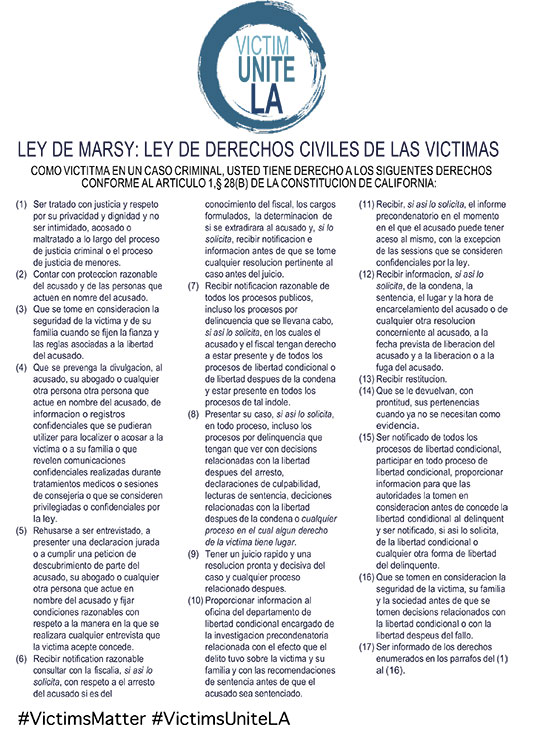Marsy's Law
As a victim or surviving family of crime you have constitutional rights which are also called Marsy’s Rights. Some of these rights are automatic. Some are not automatic, and if you want them, you must request them. Knowing your rights and requesting them is crucial. Click the button below to learn more about Marsy’s Law and what your rights are. Below is a summary of your rights:
Marsy's Law: Victims Bill of Rights
- 1) To be treated with fairness and respect and to be free from intimidation, harassment, and abuse throughout the criminal or juvenile justice process.
- 2) To be reasonably protected from the defendant and persons acting on behalf of the defendant.
- 3) To have the safety of the victim and victim's family considered in fixing the amount of bail and release conditions of the defendant.
- 4) To prevent the disclosure of confidential information or records.
- 5) To refuse an interview, deposition, or discovery request by the defendant, the defendant’s attorney, or any other person acting on behalf of the defendant, and to set reasonable conditions on the conduct of any such interview to which the victim consents.
- 6) To reasonable notice of and to speak with the prosecutor, upon request, about the case and, upon request, to be notified of and informed before any pretrial disposition of the case.
- 7) To reasonable notice of al court proceedings, including delinquency proceedings, upon request, at which the defendant and the prosecutor are entitled to be present and of all parole of other post-conviction release proceedings, and to be present at all such proceedings.
- 8) To be heard, upon request, at any proceeding, including any delinquency proceeding, involving a post- arrest release decision, plea, sentencing, post-conviction release decision, or any proceeding in which a right of the victim is at issue.
- 9) To a speedy trial and a prompt and final conclusion of the case and any related post-judgment proceedings.
- 10) To provide information to a probation department official conducting a pre-sentence investigation concerning the impact of the offense on the victim and the victim's family and any sentencing recommendations before the sentencing of the defendant.
- 11) To receive, upon request, the pre-sentence report when available to the defendant, except for those portions made confidential by law.
- 12) To be informed, upon request, of the conviction, sentence, place and time of incarceration or other disposition of the defendant, the scheduled release date of the defendant, and the release of or the escape by the defendant from custody.
- 13) To restitution.
- 14) To the prompt return of property when no longer needed as evidence.
- 15) To be informed of all parole procedures, to participate in the parole process, to provide information to the parole authority to be considered before the parole of the offender.
- 16) To have the safety of the victim, the victim's family, and the general public considered before any parole or other post-judgement release decision is made.
- 17) To be informed of the rights enumerated in paragraphs (1) through (16).

View Spanish Version
